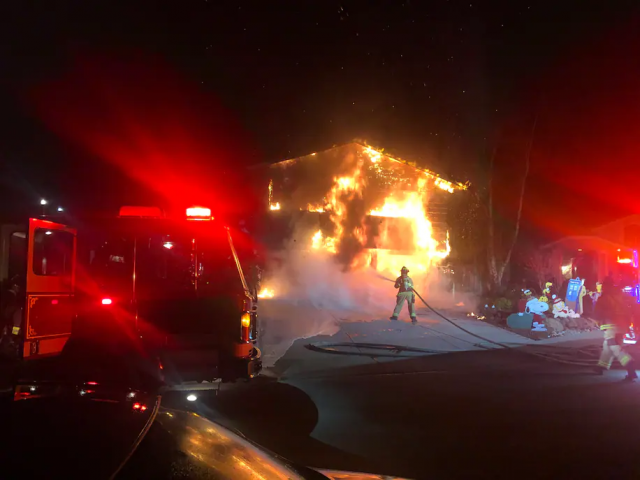There have been some interesting EV discussions on here lately, and I had toyed with the idea of someday getting one just for basic boring transportation around town. I say had, past tense, because after I saw this frightening article in the Washington Post, I figured it probably isn't worth the risk. Obviously if you have one of these, you're going to tend to want to charge it overnight in your garage if you have one. Here are some quotes from the article, and then a link to the whole thing-
While they were asleep, their Teslas burned in the garage. It’s a risk many automakers are taking seriously.
Yogi and Carolyn Vindum were still asleep late last year when their Tesla Model S beamed an alert that charging was interrupted.
Twelve minutes after that, they awoke to a blaring car alarm and a fire consuming their house in San Ramon, Calif. The blaze had started in one of the two electric vehicles in their garage and spread to the other.
“If we had lived upstairs in this house, we’d be dead,” said Yogi Vindum, a retired mechanical engineer.
The garage erupted in flames, with violent explosions powerful enough to blow off the metal garage doors, they said.
A fire inspection report obtained by the Vindums in July cited the Tesla Model S’s thermal management system as one of two possible causes of the fire, the other being a fault in the car’s electrical system as it was charging.
The fire, which has not previously been reported, is one in a string of recent examples showing what can happen when electric cars are left parked in garages to charge overnight. The issue is causing mounting concern as a number of electric-vehicle makers have warned owners not to leave the cars charging unattended in certain circumstances, or sitting fully charged in garages.
Chevrolet last year advised owners not to charge their vehicles overnight or keep their fully charged vehicles in garages. It recalled more than 60,000 of its Bolt electric vehicles over concerns about the cars spontaneously combusting while parked with full batteries or charging, after reports of five fires without prior impact damage. The company issued another recall last month covering the same vehicles after two reports of battery fires in repaired vehicles.
Hyundai spokesman Michael Stewart said the company announced a recall for its Kona EV in March in order to replace the battery. Stewart said owners were advised to lower the maximum state of charge in their vehicles to 80 percent, and park outside until the state of charge is lowered.

The home of Yogi and Carolyn Vindum in San Ramon, Calif., burns on the morning of Dec. 30 after two Tesla Model S sedans erupted in flames in the garage. (Yogi Vindum)
https://www.washingtonpost.com/tech...6wQslE7TNMQJRCReWg3KCSGh9Md2ClMDwfOfTFUa0p6F0
While they were asleep, their Teslas burned in the garage. It’s a risk many automakers are taking seriously.
Yogi and Carolyn Vindum were still asleep late last year when their Tesla Model S beamed an alert that charging was interrupted.
Twelve minutes after that, they awoke to a blaring car alarm and a fire consuming their house in San Ramon, Calif. The blaze had started in one of the two electric vehicles in their garage and spread to the other.
“If we had lived upstairs in this house, we’d be dead,” said Yogi Vindum, a retired mechanical engineer.
The garage erupted in flames, with violent explosions powerful enough to blow off the metal garage doors, they said.
A fire inspection report obtained by the Vindums in July cited the Tesla Model S’s thermal management system as one of two possible causes of the fire, the other being a fault in the car’s electrical system as it was charging.
The fire, which has not previously been reported, is one in a string of recent examples showing what can happen when electric cars are left parked in garages to charge overnight. The issue is causing mounting concern as a number of electric-vehicle makers have warned owners not to leave the cars charging unattended in certain circumstances, or sitting fully charged in garages.
Chevrolet last year advised owners not to charge their vehicles overnight or keep their fully charged vehicles in garages. It recalled more than 60,000 of its Bolt electric vehicles over concerns about the cars spontaneously combusting while parked with full batteries or charging, after reports of five fires without prior impact damage. The company issued another recall last month covering the same vehicles after two reports of battery fires in repaired vehicles.
Hyundai spokesman Michael Stewart said the company announced a recall for its Kona EV in March in order to replace the battery. Stewart said owners were advised to lower the maximum state of charge in their vehicles to 80 percent, and park outside until the state of charge is lowered.

The home of Yogi and Carolyn Vindum in San Ramon, Calif., burns on the morning of Dec. 30 after two Tesla Model S sedans erupted in flames in the garage. (Yogi Vindum)
https://www.washingtonpost.com/tech...6wQslE7TNMQJRCReWg3KCSGh9Md2ClMDwfOfTFUa0p6F0
